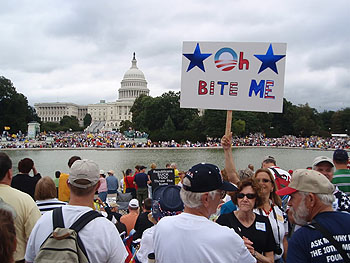In my piece last year about America’s periodic upheavals of right-wing activism, I noted that one of the common tropes about these uprisings is “a myth that the movement is composed entirely of fed-up grassroots amateurs.” Today,  David Campbell and Robert Putnam report on the results of a detailed survey of political attitudes they did in 2006. A recent followup allows them to figure out what kind of people were most likely to become members of the latest right-wing fluorescence, the tea party:
David Campbell and Robert Putnam report on the results of a detailed survey of political attitudes they did in 2006. A recent followup allows them to figure out what kind of people were most likely to become members of the latest right-wing fluorescence, the tea party:
Our analysis casts doubt on the Tea Party’s “origin story.” Early on, Tea Partiers were often described as nonpartisan political neophytes. Actually, the Tea Party’s supporters today were highly partisan Republicans long before the Tea Party was born, and were more likely than others to have contacted government officials. In fact, past Republican affiliation is the single strongest predictor of Tea Party support today.
No surprise there. What else? The recession didn’t really play much of a role in prompting people to join the tea party, they report, but other things did:
So what do Tea Partiers have in common? They are overwhelmingly white, but even compared to other white Republicans, they had a low regard for immigrants and blacks long before Barack Obama was president, and they still do.
More important, they were disproportionately social conservatives in 2006 — opposing abortion, for example — and still are today. Next to being a Republican, the strongest predictor of being a Tea Party supporter today was a desire, back in 2006, to see religion play a prominent role in politics. And Tea Partiers continue to hold these views: they seek “deeply religious” elected officials, approve of religious leaders’ engaging in politics and want religion brought into political debates. The Tea Party’s generals may say their overriding concern is a smaller government, but not their rank and file, who are more concerned about putting God in government.
And this, say Campbell and Putnam, is most likely why public opinion has lately turned so sharply against the tea party movement. Lots of Americans can sympathize with a disgust toward Wall Street or a desire for small government, but their tolerance for Christian Right fervor and retrograde social attitudes is pretty low. As it’s become clearer that this is what truly unites the tea partiers, more and more Americans are getting off the bus.
This particular bus, of course, is the campaign vehicle of choice for Michele Bachmann and Rick Perry. The Republican Party nominates either one of them at its peril.

















